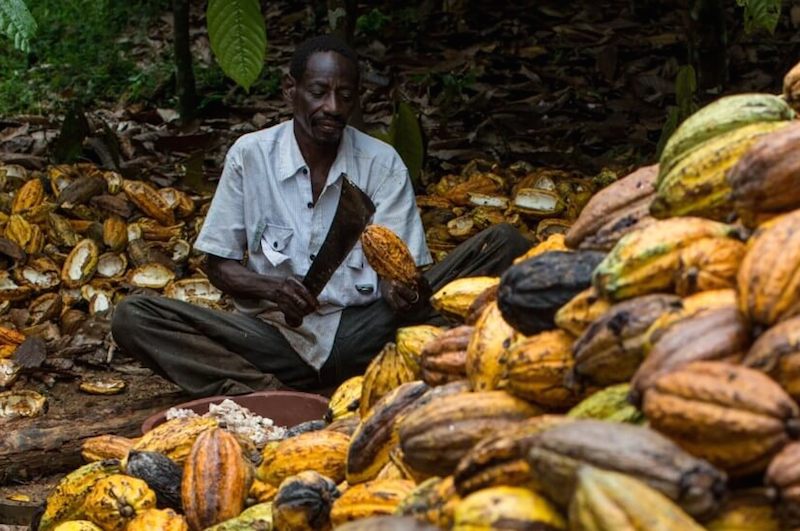By Isaac Atunlute
Over 9,000 cocoa farmers across major cocoa-producing states in Nigeria received 266,000 cocoa seedlings and 6,000 shade tree seedlings from Johnvents Group, an indigenous agricultural enterprise.
It is one of various efforts to further improve sustainable cocoa farming, build productivity, and prepare farmers for resilient climatic farming.
The distribution, which was carried out under the programme “Project Nourished Crop, Better Farmer,” focuses on rejuvenating, rehabilitating, and replanting mature cocoa plantations affected by ageing trees, low productivity and climatic stress.
Farmers were also provided with shade trees amongst cocoa seedlings to help protect young plants from excessive sun exposure, retain soil moisture, and restore biodiversity on farmlands.
Targeting key cocoa regions
The benefiting farmers, numbering above 9,000 are from main cocoa states, including Cross River, Ondo, Osun, Ekiti, Ogun, Akwa Ibom, and Abia state.
Distributions were carried out at Ikom in Cross River (61,000 seedlings), Idanre and Oda in Ondo State (50,000 each), Owo (20,000), Ile-Oluji (10,000), Ila in Osun State (5,000), and Ife (20,000). Ekiti and Ogun States each received 15,000 respectively, whereas Akwa Ibom and Abia received 10,000 each.
By reaching out to a broad geographical zone, the programme caters to both large-scale and smallholder farmers, whose productivity would be cramped by limited supplies of improved seedlings.
Climate and economic implications
Nigeria is ranked among the world’s largest producers of cocoa, a crop that supports the livelihoods of hundreds of thousands of smallholder farmers.
However, various challenges hit the industry — ageing plantations, pests, unpredictable rainfall patterns, and market pressure from other better-weathered crops.
Introducing improved seedlings, especially alongside shade trees, would help extend the productive lifespan of farms and make them better equipped to resist extreme-weather conditions.
The shade trees are also critical for soil fertility and biodiversity, by intercropping cocoa with tree species that provide canopy cover, farmers can reduce evaporation, improve soil health, and attract pollinators—a strategy increasingly recognised by agricultural experts as essential for cocoa sustainability.
A growing model in Africa
Such programmes have been in progress in other producing countries. Ghana’s Cocoa Board, or COCOBOD, has rolled out a nationwide initiative distributing five million hybrid cocoa seedlings to farmers, paired with increased fertiliser subsidies, to enhance yields and bolster the country’s position as a global cocoa leader.
Such initiatives are one part of a broader trend across west Africa — connecting seed supply to sustainable agriculture and market demand.
Looking ahead
The provision of shade tree seedlings indicates a broadening perspective about cocoa farming as part of an environmental and food security strategy.
Agroforestry systems, which combine crops and trees, are growing popular worldwide for their potential to minimise land degradation while sustaining livelihoods.
And with further seedling distribution planned over the course of the next few months, the project is presented as part of an ongoing effort to restore thousands of hectares of cocoa farmland by 2030.
But the expansion of such programmes will rely on sustained collaboration between agribusiness firms, government departments, and farmers’ organisations—along with stable market prices to incentivise farmers to keep on investing in cocoa.
As Nigeria struggles to maintain its place in the global market for cocoa, initiatives like these underscore the link between environmental sustainability and economic survival.
Replanting farms is not only about increasing production in the next harvest but also about securing the crop’s future under a changing climate, sustaining rural livelihoods, and transforming cocoa into sustainable livelihoods for generations to come.
Over 9,000 cocoa farmers in Nigeria's major cocoa-producing states received 266,000 cocoa seedlings and 6,000 shade tree seedlings from Johnvents Group as part of the “Project Nourished Crop, Better Farmer.” This initiative aims to rejuvenate cocoa plantations affected by ageing, low productivity, and climatic stress while promoting sustainable cocoa farming and enhancing productivity. The programme targeted states such as Cross River, Ondo, Osun, Ekiti, Ogun, Akwa Ibom, and Abia, ensuring that both large-scale and smallholder farmers benefit from improved seedlings.
Nigeria, a leading cocoa producer, faces challenges including ageing plantations, pests, and market pressures. The introduction of improved seedlings with shade trees is intended to enhance farm resilience against extreme weather and improve biodiversity and soil fertility. The project aligns with trends in West Africa, with other countries like Ghana implementing similar initiatives to connect seed supply with sustainable agriculture and market needs.
As part of a broader environmental and food security strategy, the programme emphasizes agroforestry systems that combine crops and trees. This approach aims to restore thousands of hectares of farmland by 2030, highlighting the importance of collaboration among agribusinesses, government, and farmers’ organizations. The initiative indicates a growing recognition of the link between environmental sustainability and economic stability, ensuring cocoa continues to sustain livelihoods amidst climatic changes.






